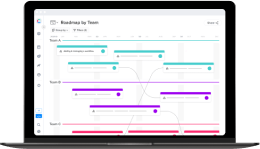Home > Blog > How to Distinguish Abilities of A Product Manager from A Product Engineer
How to Distinguish Abilities of A Product Manager from A Product Engineer

Who’s a Product Engineer, anyway? It’s sometimes hard to distinguish between a Product Manager and a Product Engineer. In this post, we’ll have a try to figure it out.
Among one hundred and one job titles, the Product Manager is, perhaps, the most confusing. The truth is that various companies use various job title specifications, from the Strategic Product Managers to eCommerce or Product Development Managers or even all-in-one. Average people can hardly see any difference, but the professionals can. The greatest difference between engineers and managers is that the term Technical Manager or Product Engineer is more likely to describe a person, but not his or her role. Thus, this is simply a PM who has a certain technical background and is enrolled in product technology work. However, they do not perform any development themselves, though communicate and manage the software development team within a scrum management process.
They are extremely needful under circumstances when the company’s great Product Manager must be extremely focused on management of the product, not its development issues. As you see being a Product Manager in product technology is quite a different thing.
Product Manager vs. Engineering
As if the often-conflicting job descriptions of Product Managers didn’t create enough confusion, many companies also have roles they describe as Product Engineers. How do we understand the distinctions in product management vs. engineering? Can we clearly differentiate these roles — Product Manager vs. Product Engineer? Let’s give it a try.
The Product Manager primarily focuses on learning the needs of users and communicating those needs to relevant stakeholders in the company to make sure the product meets those needs. The Product Engineer’s role is to know the technological ins and outs of product development — to help ensure the technical team can execute on the Product Manager’s business objectives as successfully and cost-effectively as possible.
In other words, the Product Manager and Product Engineer roles are complementary. You can think of these people as partnering and handing responsibility back and forth to ensure product success.
Of course, technical skills will be a highlight of this position. A technology-savvy engineer has huge advantages:
- proven trust from development team,
- understanding of tech trends, how include them into roadmap and implement the innovations,
- agreement of opinion and proven trust of the customers,
- understanding of tech challenges and ability to educate the team,
- ability to create tech solutions for the product life cycle rather than focus on business and users need solutions.
Product Engineers know better than Product Managers or anyone else what is possible and what’s not regarding developing the product and driving its vision, so they come in handy for the PMs and should work back-to-back to come up with better products.
Product Manager Tips for Engineers
No matter how much a Product Manager makes, you can outperform him or her as a product engineer by following simple steps:
1) Use tech skills for planing and prioritizing
When you understand clearly how your product is built, you’re more likely to have the adequate risk evaluation of certain feature, have more accurate time frame setting for story mapping or road mapping. Remember that you are a narrow specialist that can talk to the development team more lucidly and in detail. You orientate better in decision making and understand the implications so can better do the trade-offs about depths, complexity or time frames.
2) Use tech skills to minimize the gap in communication
It sometimes happens that product engineers have a gap in communication between their engineering stuff and the rest of the whole world. Also, tech people sometimes forget that they can be hardly understood by the rest of the team: by sales, marketers, etc. You should use your tech skills to cater the technical product details to the rest of the world translating between the engineering department and the rest of the product world, including the customer.
3) Use your tech skills to improve the business role side
Want it or not, the role of any manager (product or engineer) should be based on the users need understanding and bringing the product to life alongside the rest of departments. You are keen on the tech part of the whole process, so do not forget to contribute to the ultimate goal.
Technical Product Manager Checklist
Apart from useful tips on how to improve your abilities in a role of engineering, there is a list of things you’d better undo to succeed in your product engineering career. Here they are:
- Do not misunderstand the role.
The truth is that many engineers make the same common mistake: when they come from development, they experience hardships in leaving their comfort zone and realizing that their value has shifted a bit into quite a different area. So, they remain too engrossed by the tech side the procedure may meddle and cause problems, defining the technical solution for peculiar product feature, instead of defining the business may meddle and cause issues, of the expected user outcome. Btw, try craft.io for issue tracking to increase the quality of your product development processes.
- Do not undertake too much.
The point is that some companies sometimes position the role and give you responsibilities in such way, that you become an extension of your development. You find your self-taken non-product management deliverable. No coding or QR testing, just vision, road mapping, story mapping or whatever else the manager should perform! Do not undertake too much.
- Don’t be caught in the methodology you use.
Staying involved in agile as they used to, technical PMs feel really comfortable with the day to day flow of tasks. That’s why they come from development to product management easier. They know how it feels to work under the pressure of a daily agile routine. Nevertheless, they forget that agile is actually the smallest PM role and focusing on it too much go astray from the basic PM responsibilities.
To Sum Up
Various companies have varieties of PM job title specifications; that is why Product Managers and Technical Product Managers are often confused in scope of their major role and the abilities distinguished. Though, some of them match, indeed, the major difference is that an engineering manager has a tech background, unlike a PM who’ got a more business-oriented role.
To succeed as a Technical Product Manager, you should follow some tips to develop certain abilities and learn how to undo the other ones to succeed.
And why do you want to be a Product Manager in technology? Feel free to share your ideas!
Ready to build great products?


